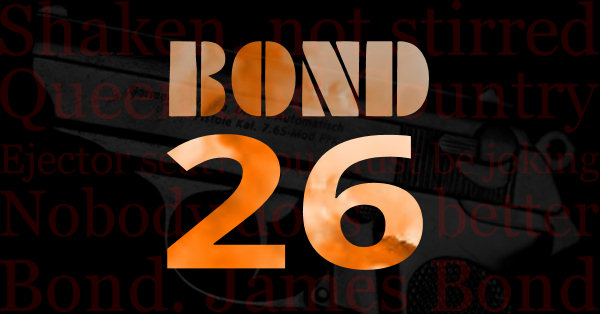Nearly a decade before Connery brought 007 to life for millions of cinema goers, Barry Nelson played 007 in a television version of Casino Royale. In this article we take a look at that, as well as the other non-canonical James Bond films.
Not what you’re looking for? Click here for the James Bond movies by Eon Productions
Casino Royale (1954)

When most of us think of the James Bond films we think of the long-running series by Eon Productions, now more than 50 years old. However, while the success of every new Bond movie is almost guaranteed, prior to Dr No (1962) Ian Fleming saw the cinematic potential his creation and spent considerable effort trying to sell the screen rights to 007.
A direct result of that is two other versions of Casino Royale, while it indirectly caused the rights to Thunderball to be awarded to Kevin McClory, who in 1984 made Never Say Never Again and brought back Sean Connery as 007.
Eight years before Sean Connery donned a tuxedo in Dr No, Barry Nelson played Ian Fleming’s secret agent in a live television adaptation of Casino Royale in the Climax! series on CBS. Fleming was paid $1000 by CBS in 1954 in exchange for adapting his first novel for TV.
Nelson’s character was an American agent sometimes referred to as “Jimmy”, assisted by British agent Clarence Leiter and the very first Bond Girl, Valerie Mathis, while Le Chiffre was played by Peter Lorre.
While this TV production is often dismissed by fans, and it is a long way from how we perceive James Bond films to be today, it needs to be seen in terms of the time it was made and the medium used and from that point of view the book was adapted moderately well, and is certainly far more faithful to the original book than many of the Eon films.
Casino Royale (1967)

A year later Fleming sold the Casino Royale film rights to Gregory Ratoff for $6,000. Although he intended to make a movie of the book, Ratoff was unable to raise finance and died in 1960.
Producer Charles K Feldman purchased the rights from Ratoff’s widow, initially planning a serious adaptation directed by Howard Hawks. Feldman actually turned down an offer from Cubby Broccoli for the film rights prior to his collaboration with Harry Saltzman, a decision he must have later regretted.
After the release of Dr No in 1962 Feldman instead tried to do a co-production deal with Eon Productions and when that fell through tried to poach Sean Connery; his demand for a $1 million fee was declined and in the end Feldman decided to make the film as a spoof.
Filming was chaotic, with five different directors, numerous scriptwriters and constant script changes throughout the shoot, resulting in the $6 million budget rapidly inflated to $12 million as the schedule overran. While $6 million may not sound like much compared with today bear in mind that Thunderball (1965) cost $11 million and You Only Live Twice (released the same year as Casino Royale) was $9.5 million.
The film is chock-a-block of big name talent, including David Niven, Orson Wells, Woody Allen and Peter Sellers (who left the production early, although it is not clear if he walked off or was fired) and also includes the first Bond girl, Ursula Andress, and the very first screen appearance of Darth Vader actor Dave Prowse (as Frankenstein’s monster).
However, the result is a real mess and the surreal ending, perhaps a product of its time, seems more like a bad acid trip than a James Bond movie.
Perhaps the only winner here was Burt Baccarat, who provided a great title song and although it remains a curiosity for Bond fans the film has little to really recommend it. Just imagine that prior to 2006, this is what came to mind for Bond fans when they though about a movie adaptation of Casino Royale!
Never Say Never Again (1983)

While Eon Productions originally planned to film Thunderball as the first James Bond film they were forced into selecting another book from which to base their movie after Kevin McClory sued Ian Fleming for plagiarism.
The short story: Fleming had used screenplays worked upon by both himself, McClory and Jack Whittingham when writing Thunderball without their consent and without credit. The eventual outcome of the case was that McClory was awarded the movie rights to these scripts (as well as he and Whittingham being credited in future editions of the novel).
When it came to film Thunderball Cubby Broccoli and Harry Saltzman stepped back from their producer roles and instead brought in McClory as producer. That way they were able to film the book, while diffusing the threat of a rival James Bond series.
He then laid low for the next decade while he waited out his contractual obligation to do no more with these for ten years but his key problem was that his rights were limited to only those screenplays and so he was limited to repeating the same story again and again; cynics may scoff that’s what happened anyway, and to a certain extent they do have a point.
McClory brought in Len Deighton and and Sean Connery to work on a new script based on Thunderball, under the title Warhead. To cut a long story short, Jack Schwartzman came on board and cleared up the legal difficulties that prevented the project from moving forward, Lorenzo Semple Jr was hired to redo the script and Sean Connery eventuality persuaded to step into the role of James Bond for the first time since Diamonds Are Forever. Connery vowed “never again” after that final film for Eon, hence the eventual title.
Directed by Irvin Keshner, who was responsible for The Empire Strikes Back, the film may have Connery and it may have a genuine Fleming plot, but its shortcomings shows how well Cubby Broccoli knew what he was doing, and in the end film would go head to head with Octopussy.
Although it is good to see Connery back as 007, the film is unsatisfying as a Bond movie. It is a third rate version of Thunderball; a curiosity but little more and doesn’t even stand up on its own.
For the full Thunderball story I recommend The Battle For Bond (2007) by Robert Sellers (Amazon UK | Amazon.com) and James Bond: My Long and Eventful Search for His Father (2013) by Len Deighton (Amazon UK | Amazon.com).
Although he would try several times again to remake Thunderball, McClory died in 2006. Finally in 2013, McClory’s heirs reached an agreement with Eon Productions in which their received the rights to Thunderball and and the use of SPECTRE and Ernst Stavro Blofeld and, at long last, the end of any talk of a rival James Bond film series.
Click here for more on the James Bond films











Leave a Reply.